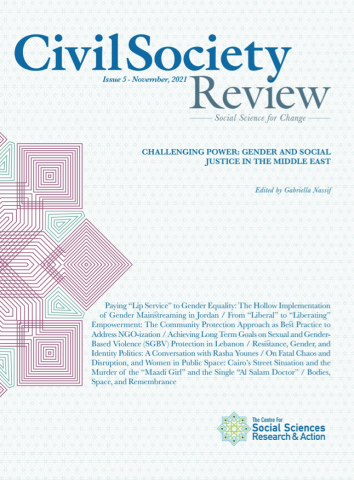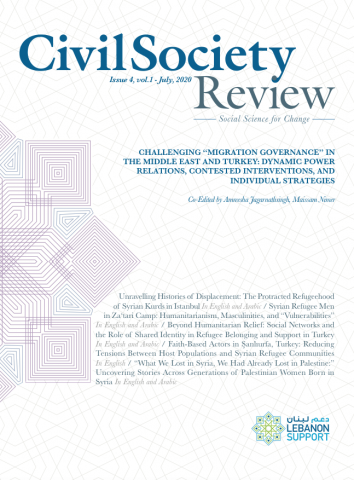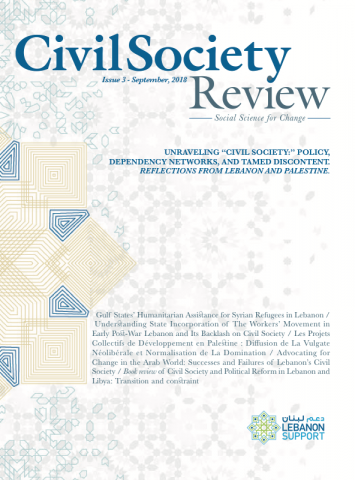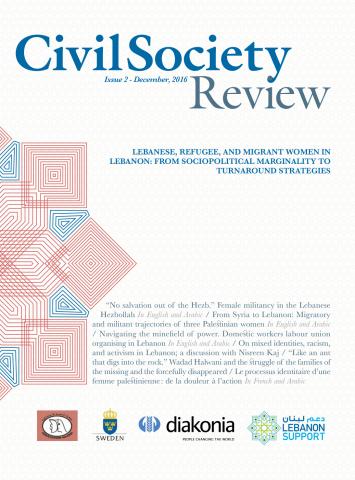Published by The Centre for Social Sciences Research and Action, the Civil Society Review emphasises cutting-edge and critical transdisciplinary analysis in a wide range of topics relevant to social sciences. It offers a novel space where academics and practitioners converge to discuss theories and reflect on practices.
It demonstrates a variety of perspectives through dynamic, historicised, and processual approaches to reflections on civil society action, and strategies in the region. While we acknowledge the polysemy and controversy behind the concept of "civil society", and the often elusive opposition it displays, we are committed to producing original literature that both offers a reflection on civil society, particularly its contentious role and autonomy, as well as creates knowledge for what we hope can constitute tools for action and social change in the region. In this vein, the Civil Society Review, grounded in empirical research, aims at contributing to a theoretical production adopting a comparative approach among countries in the region and elsewhere. It hence focuses on the creation of a knowledge space for epistemological debates, theoretical usages, as well as empirical methodologies.
The Civil Society Review produces evidence-based research and analysis, and disseminates findings and recommendations to promote civic engagement, shape policies, and stimulate debate within civil society spheres.
In addition to its editorial board, the Civil Society Review draws expertise from practitioners, experts, researchers, and policy makers. First published in print, the Civil Society Review is made available online at a later stage.
ISSN 2617-6025 (Online), ISSN 2519-6375 (Print).
Editorial Board














The Centre encourages contributions from experienced scholars, early career researchers, PhD candidates, practitioners, activists, and civil society experts.
The Civil Society Review only accepts online submissions sent to: editor[at]socialsciences[dash]centre[dot]org.
Submissions in English, Arabic, and French are accepted. Submissions must comply with the Centre’s guidelines. Priority is given to submissions that adopt a radical and critical approach to related concepts and categories, engage with a solid theoretical framework, and are based on empirical research. All submissions – of papers, and thematic issues – are reviewed by the editorial board, which can accept the proposal as is, suggest modifications, or reject it.
For thematic issues submission, coordinator/s of the issue should submit:
- General presentation of the proposed thematic, with proposed title of the issue (2 pages)
- Proposal of table of contents, with at least 5 articles and identified authors
- Issue editor’s CV
- Issue editor’s short biography (200 words)
- Issue editor’s cover letter
If the thematic issue is approved, the issue editor is expected to follow up on the process of developing the issue, in collaboration with the editorial board.
* In the case of submission of a proposal for a thematic issue, without identified authors/ article, and therefore requiring the publication of an open call, please submit the above documents mentioning in the subject line: Proposition of thematic call.
Lebanon Support encourages contributions from experienced scholars, early career researchers, PhD candidates, practitioners, activists, and civil society experts.
The Civil Society Review only accepts online submissions sent to: editor[at]lebanon[dash]support[dot]org.
Submissions in English, Arabic, and French are accepted. Submissions must comply with Lebanon Support’s guidelines. Priority is given to submissions that adopt a radical and critical approach to related concepts and categories, engage with a solid theoretical framework, and are based on empirical research. All submissions – of papers, and thematic issues – are reviewed by the editorial board, which can accept the proposal as is, suggest modifications, or reject it.
For thematic issues submission, coordinator/s of the issue should submit:
- General presentation of the proposed thematic, with proposed title of the issue (2 pages)
- Proposal of table of contents, with at least 5 articles and identified authors
- Issue editor’s CV
- Issue editor’s short biography (200 words)
- Issue editor’s cover letter
If the thematic issue is approved, the issue editor is expected to follow up on the process of developing the issue, in collaboration with the editorial board.
* In the case of submission of a proposal for a thematic issue, without identified authors/ article, and therefore requiring the publication of an open call, please submit the above documents mentioning in the subject line: Proposition of thematic call.
For manuscript submissions, author/s should send:
- Manuscript Type (See below)
- Title of manuscript
- Name of author, Title
- Institution
- Short biography of author/s (200 words)
- Abstract Keywords
Manuscript Type
Original Manuscript: Original Research papers should be between 8,000 and 10,000 words. Tables, figures, illustrations and references are included in the word count.
Shorter articles: Original Research based on masters, or PhD dissertations. It can also feature contributions on ongoing research or work in progress, as well as portraits, testimonials, or interviews.
Book Review: Book Reviews should be between 500-700 words in length and prefaced with bibliographic information in the following form: Title of Book Author/s or Editor/s Personal then Surname/s Place: Publisher Year ISBN Price, hb or pb pp.
The review should conclude with the full name and institutional affiliation of the reviewer, each on a separate line. The page should contain the title, author names and affiliations, and acknowledgments with the corresponding author’s complete mailing address and email address. The abstract should not exceed 250 words and should summarize the article’s quest with or without conclusions, and without references.
We encourage you to enter appropriate keywords, as this helps us match appropriate reviewers to your manuscript.


